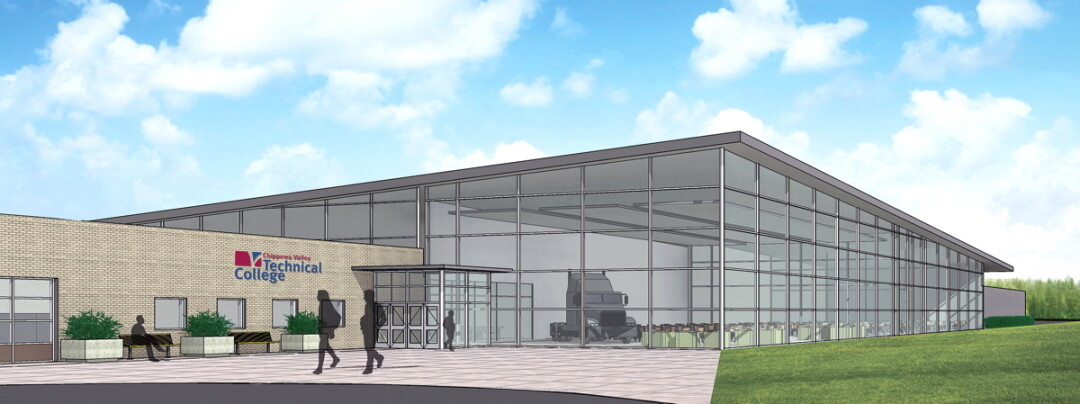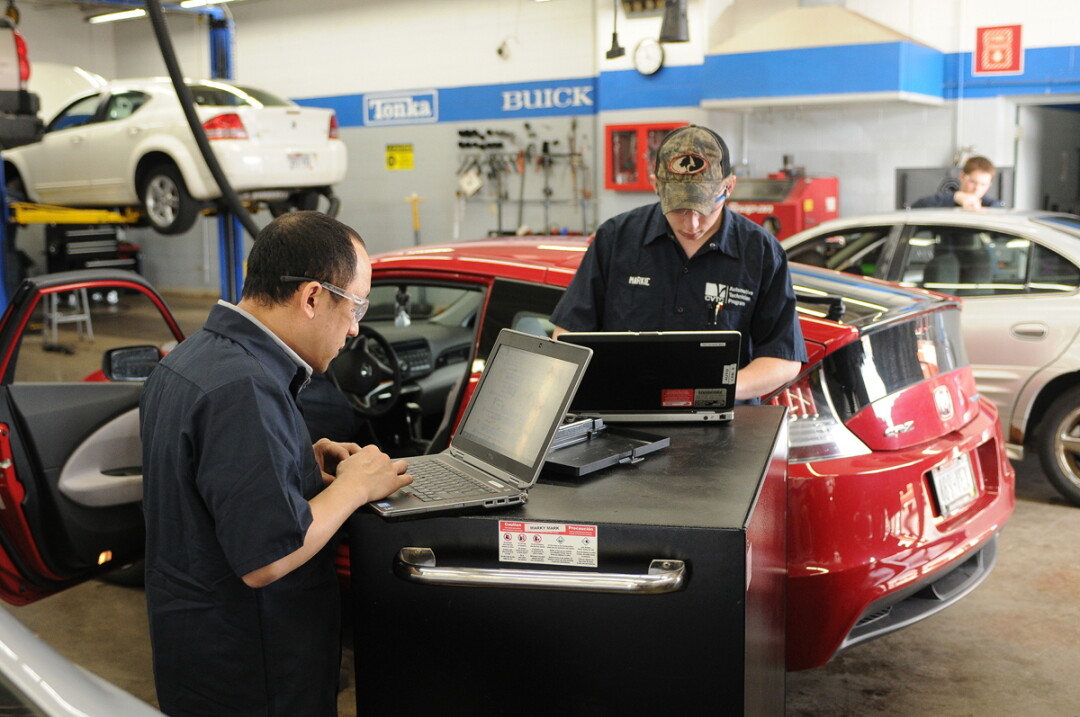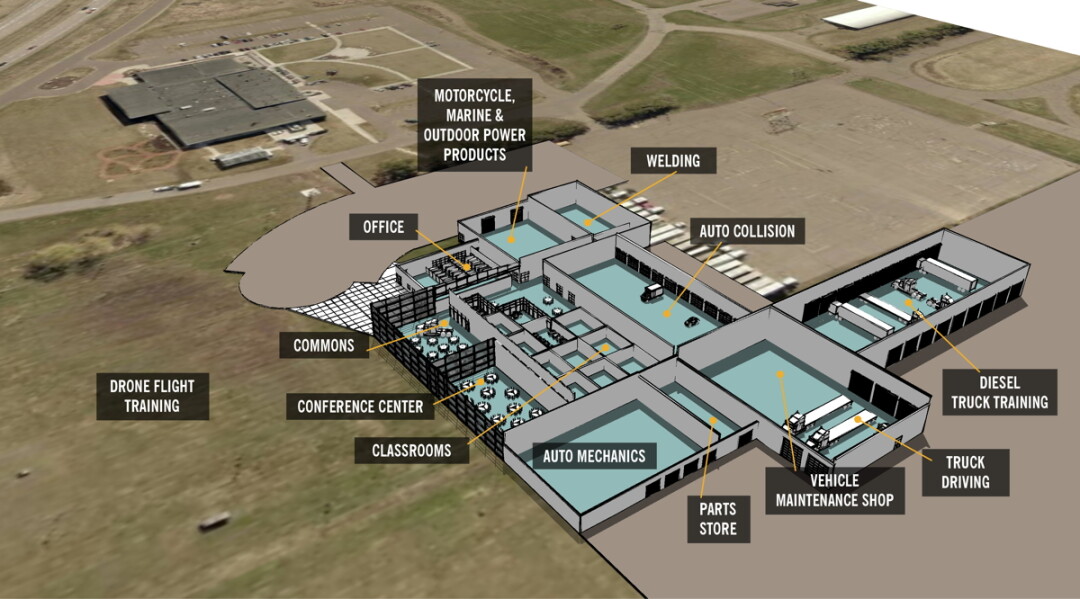TECHNICAL QUESTION: Voters will face $48.8 million referendum to fund CVTC facilities

Whether you realize it or not, if you live in the Chippewa Valley, Chippewa Valley Technical College probably touches your life every day, says Bruce Barker, the college’s president.
If you live in a wood-framed home, Barker said, it was probably built or repaired by a CVTC graduate, and CVTC-educated workers likely helped install or fix its heating, air conditioning, and plumbing. Your electricity came thanks to CVTC-trained linemen. CVTC grads have likely serviced your car, cleaned your teeth, or cared for your children. Each year, the Eau Claire-based technical college serves nearly 19,000 students in more than 155 programs.
Barker notes that 95% of CVTC grads have jobs within six months of graduation, 89% of them in fields related to their training – the highest share among Wisconsin’s 16 technical colleges. Furthermore, starting salary for CVTC grads is $46,816.
“We talk about education that ends in a job description,” Barker said. And keeping up with the region’s workforce needs has led CVTC to pursue an April 7 ballot referendum that, if successful, would bring in $48.8 million from local property tax payers for new and expanded facilities. The referendum would have an estimated annual property tax impact of $13 a year for the owner of a $100,000 home. Currently, the owner of that hypothetical home pays $81.97 annually to CVTC, which receives about 25% of its funding from property taxes.
The referendum would fund the construction of a new Transportation Education Center, expansion and remodeling of the Emergency Service Education Center, an addition to the Manufacturing Education Center, buying land to expand the college’s River Falls campus, and several smaller projects.

CVTC serves all or part of 11 counties in west-central Wisconsin, from St. Croix County on the Minnesota border in the west to rural Clark County in the east. The primary CVTC facilities are in Eau Claire, and there are satellite campuses in Menomonie, Chippewa Falls, River Falls, and Neillsville.
“I don’t think people realize how large we are,” Barker said. During the 2018-19 school year, for example, CVTC had 18,595 students – roughly half of them enrolled in its programs and half who were already employees of local businesses that contracted with CVTC to provide on-site instruction.
In January, CVTC’s board approved the move to go toward a referendum. (Under state law, such a vote of district residents is required when a technical college wants to spend more than $1.5 million on expansion over a two-year period.) “Our goal is to address workforce and safety training needs throughout the district,” Paul Bauer of Ellsworth, the board president, said at the time. “We have a growing labor shortage and need to make structural changes to accommodate new technology and meet the expectations of employers.”

Here’s how the $48.8 million referendum breaks down:
TRANSPORTATION
The referendum includes $28 million for a new, 124,000-square-foot Transportation Education Center, to be built on CVTC’s west campus. The new facility would allow the college to consolidate five transportation programs located in five different places. “Truck Driving and Diesel Truck Technician, for example, are separated by miles,” said Adam Wehling, dean of agriculture, energy, and transportation. “With one location, we would be able to share equipment and resources, which would make us more efficient. With program students working together, it would make the student experience more valuable.” The new facilities will give students the opportunity to learn how to work not only on traditional diesel and gasoline engines but also cutting-edge electric, hybrid, and compressed natural gas-fueled vehicles.
EMERGENCY SERVICES
The referendum includes $9.5 million to add 27,000 square feet and remodel 20,000 square feet at the Emergency Service Education Center, which was built on the west campus after CVTC’s last referendum in 1997. CVTC officials say the new and remodeled space – which will include an Emergency Medical Services simulation area and a larger firing range – will help them better train first responders. The project will also help local police and fire departments meet their training needs.
OTHER PROJECTS
In addition, $3 million of the referendum funds is set aside for a 10,000-square-foot addition to the Manufacturing Education Center, in large part to train more welders for local manufacturers. And $2.5 million would be used to buy 6.7 acres next to the River Falls campus, which could be used for further expansion. Updates would also be made at the Menomonie and Chippewa Falls campuses.
If the referendum is approved, the projects will conducted in three phases from 2021 to 2023. While Barker is hesitant to tie a specific enrollment goal to the new projects – in part because technical college enrollment is intertwined with the health of the economy – he’s optimistic the proposed facilities will provide a boost to the college and the communities it serves.
“The programs we offer and the job skills we teach directly impact the quality of life in the Chippewa Valley,” Barker said. “Skilled positions in health care, manufacturing, transportation, agriculture, as well as protective services all require the specialized education that only CVTC provides. That’s why it is critical for CVTC to keep its programming, technology, and facilities current.”




















